Key Highlights
- AI agents transform leadership by turning slow, complex decisions into faster, proactive strategies.
- Agentic AI analyzes data, sets goals, and executes complex tasks with minimal human input.
- The decision-making loop covers goal setting, data collection, reasoning, evaluation, execution, and monitoring.
- Unlike LLMs, AI agents deliver outcomes by completing tasks across enterprise systems.
- Leaders gain faster decisions, unbiased insights, scenario simulations, and freedom from routine tasks.
- Real-world uses include finance, healthcare, marketing, HR, and supply chain optimization.
- The Human Algorithm blends AI efficiency with human empathy, ethics, and contextual judgment.
Business leaders are drowning in endless reports, shifting markets, and constant pressure to act quickly. Every decision feels like a high-stakes gamble where one mistake can cost revenue, reputation, and trust.
The frustration grows when outdated tools slow leaders down instead of helping them see clearly. Opportunities slip away, teams lose confidence, and competitors race ahead. The cost of hesitation is brutal, with shrinking margins and leadership teams scrambling to catch up.
AI agents change this dynamic by analyzing data in seconds, simulating outcomes, and delivering clear insights. The real breakthrough comes when their efficiency is combined with human judgment. At Wild Creek Web Studio, we call this the Human Algorithm. It helps leaders think better, not just faster, by blending AI-driven clarity with empathy, ethics, and context. This blog explores how AI agents are reshaping leadership while keeping the human touch irreplaceable.
What Is AI Agent Decision Making?
AI agent decision-making is when intelligent systems do more than just process data. They can analyze information, plan actions, and even carry out tasks with minimum human assistance. Unlike dashboards that only show past results, agents adapt in real-time, learn from feedback, and provide leaders with clear, actionable insights.
Think of it this way: a chatbot like ChatGPT can give you an answer, but an AI agent can take action. For example, instead of only suggesting an email draft, an agent could design and run the entire campaign. It bridges the gap between gathering information and taking action.
This matters for leaders because traditional tools leave them guessing about the next step. AI agents cut through the noise, spot opportunities quickly, and respond to changes as they happen. The real power comes when their efficiency is combined with human judgment, ensuring decisions are not only faster but also smarter and aligned with values.
How Do AI Agents Make Decisions?
Every leader knows how frustrating slow decision-making can be. Reports arrive late, data feels incomplete, and meetings drag on without clear answers. By the time a decision is made, the market has shifted, customers have moved on, and competitors are already ahead.
Gartner reports that 65% of leaders say their decisions are more complex today than just two years ago, while 53% feel greater pressure to explain or justify every choice. The cost of this complexity is wasted time, missed opportunities, and shrinking margins.
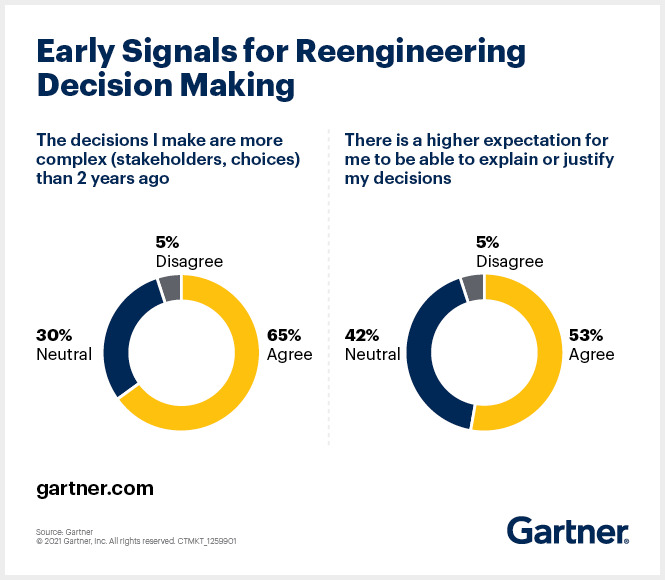
Early Signals for Reengineering Decision Making Gartner
AI agents change this dynamic. They follow a structured AI agent decision making process that turns raw data into action with speed and confidence. Instead of surface-level analysis, they provide real-time clarity, helping leaders stay proactive rather than reactive.
The decision-making loop of AI agents works like this:
| Stage | What Happens | Business Benefit |
| 1. Goal Setting | AI receives objectives and constraints. | Aligns actions with strategy. |
| 2. Data Collection | Pulls structured and unstructured data. | Creates a complete picture. |
| 3. Reasoning & Planning | Generates possible solutions. | Surfaces smarter options. |
| 4. Evaluation | Simulates outcomes. | Reduces risk in choices. |
| 5. Execution | Connects with tools and automates steps. | Speeds up implementation. |
| 6. Monitoring | Tracks results and adapts in real time. | Ensures continuous improvement. |
This structured loop explains how do AI agents make decisions and why they are more than digital assistants. They act as strategic partners, managing complexity while giving leaders space to focus on ethics, context, and long-term vision. That is the essence of the Human Algorithm: combining AI efficiency with human judgment to make decisions that are not only faster, but smarter and more accountable.
Is An AI Agent Just An LLM With Decision Capabilities?
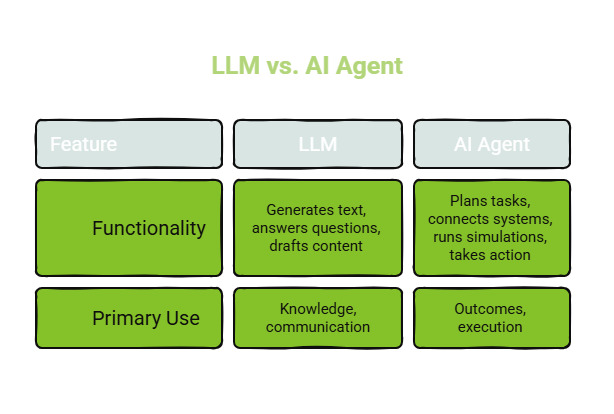
Comparison chart of LLM vs AI Agent
It is tempting to believe that AI agents are just large language models with a fancy name. Leaders see ChatGPT generating text and assume agents are simply smarter chatbots. However, that view overlooks the actual transformation. Treating agents as just LLMs risks holding on to old tools when smarter, more autonomous systems are already available.
As Andrew Ng once said: “Just as electricity transformed almost everything 100 years ago, today I actually have a hard time thinking of an industry that I don’t think AI will transform in the next several years.” Just as electricity powered industries far beyond lighting, agentic AI autonomous decision-making goes far beyond generating words. Agents perceive, plan, and act in ways that redefine the nature of leadership decision-making.
The difference looks like this:
| LLM (Large Language Model) | AI Agent |
| Generates text, answers questions, and drafts content based on patterns in data. | Plans multi-step tasks, connects with CRMs or financial tools, runs simulations, and takes action with minimal human oversight. |
| Useful for knowledge and communication. | Designed for outcomes, bridging the gap between insight and execution. |
So, is an AI agent just an LLM with decision capabilities? That’s a common misconception, but the reality is much broader. An LLM provides information, while an AI agent delivers results. The real advantage comes when leaders pair AI efficiency with human judgment to ensure that decisions remain ethical, contextual, and strategic.
Curious about AI’s impact on search? Check out: What Is LLMO & How Does It Impact Your SEO Strategy in 2025?
Why Do Leaders Need Agentic AI For Decision-Making?
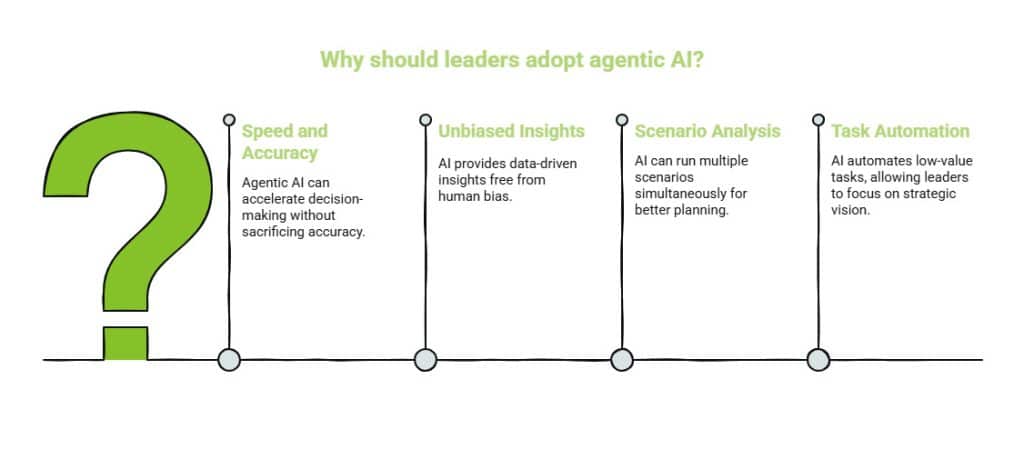
Why Leaders Need Agentic AI visual selection
Markets shift overnight, customer expectations evolve constantly, and teams look to leadership for clarity and direction. Traditional tools often add to the frustration by showing past data without guiding the next move. Agentic AI changes that by turning information into timely, actionable strategies.
1. Speeding Up Decisions Without Compromising Accuracy
Delays in decision-making cost both money and momentum. Reports take days, data is fragmented, and by the time leaders act, opportunities are gone.
With agentic AI, insights arrive in real time. What once took weeks now happens in minutes. For example, retail chains use AI agents to adjust pricing daily based on competitor moves and customer demand, boosting margins while staying agile.
2. Providing Unbiased, Data-Backed Insights
Human judgment is strong but can be swayed by bias or the loudest voice in the room. This creates blind spots in critical choices.
AI agents ground decisions in objective data, surfacing patterns leaders may overlook. In financial services, they flag lending risks based purely on numbers, not assumptions, helping executives make sharper, more informed decisions.
3. Running Multiple Scenarios Simultaneously
Strategic choices such as whether to launch now, expand into a market, or cut costs require exploring trade-offs. Doing this manually overwhelms already stretched leadership teams.
AI agents run countless “what-if” simulations instantly. Healthcare networks, for instance, use agents to test staffing models across hospitals, finding the best way to cut costs without reducing quality of care.
4. Automating Low-Value Tasks So Leaders Focus on Vision
Leaders should focus on culture and long-term growth, not routine approvals or firefighting. Yet many are stuck in repetitive, low-value tasks.
AI agents automate workflows, reporting, and operational decisions. In HR, they screen candidates and schedule interviews, giving leaders more time to drive strategy and nurture teams.
Agentic AI gives leaders speed, scale, and sharper insights, but it does not replace the human algorithm. At Wild Creek Web Studio, we believe the future of leadership lies in blending AI efficiency with human judgment. Our approach helps organizations harness agentic AI decision making while keeping empathy, ethics, and context at the center.
Forward-thinking organizations are beginning to explore how agentic AI can support ethical, long-term decisions. At Wild Creek, we partner with them to navigate this journey.
How Do AI Agents Enhance Decision-Making Processes In Businesses?
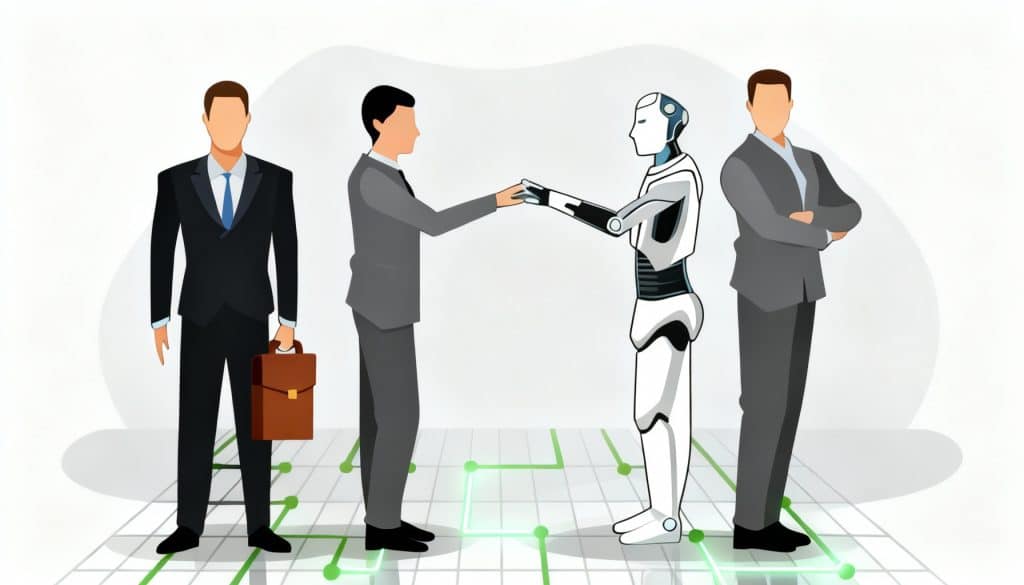
Business leaders collaborating with an AI robot to improve decision making
Leaders lose valuable hours on routine choices that add little strategic value. Every minute spent reviewing spreadsheets, chasing anomalies, or prioritizing tasks is a minute stolen from vision and growth. This daily grind not only wastes time, but it also creates fatigue and hinders the most important decisions.
AI agents productivity decision-making daily routines solve this by automating repetitive tasks and surfacing sharper insights that leaders can act on instantly.
Real-World Examples
Here are some real-world examples of how AI agents streamline decision-making across daily business routines:
- Drafting Executive Briefs: Summarize key reports and highlight the essential information leaders need to know each morning.
- Monitoring Financial Anomalies: Flag risks in real time before they spiral into bigger problems.
- Optimizing Workforce Scheduling: Balance workloads and cut inefficiencies automatically.
- Prioritizing Marketing Campaigns: Rank opportunities so teams invest where ROI is highest.
McKinsey research shows that agentic AI can deliver a 20–60% increase in productivity in complex decision-making workflows, giving leadership teams more capacity to focus on growth. By enhancing productivity, AI agents free leaders to think strategically instead of drowning in operational noise. The result is faster, more confident decisions that shift leadership from a reactive to a proactive approach.
How Can Agentic AI Strengthen My Strategic Planning?
When leaders rely solely on intuition, they risk falling into blind spots that can undermine their strategy and performance. Agentic AI data driven decisions minimize that risk by turning scattered information into clear, actionable insights.
Here are the key advantages leaders gain from using agentic AI in data-driven decision-making:
- Synthesizing Data Across Silos: Integrate information from multiple departments to create a complete and unified view.
- Spotting Hidden Correlations: Identify trends and connections that remain invisible to human analysis.
- Supporting Predictive Modeling: Anticipate outcomes with greater accuracy and strengthen foresight in planning.
- Enhancing Speed and Accuracy: Process large volumes of data instantly, reducing delays while improving reliability.
- Reducing Human Bias: Counteract the influence of personal or unconscious bias in high-stakes decisions.
- Improving Resource Allocation: Direct time, talent, and budgets toward areas with the greatest potential ROI.
- Driving Competitive Advantage: Enable leaders to move ahead of competitors by acting on insights faster.
Leaders can shift from reactive to proactive strategies with data-backed confidence, ensuring decisions are accurate, fair, and aligned with long-term growth.
Do you want to break free from outdated marketing playbooks? Read: Stay Ahead with Modern Digital Marketing Frameworks
How Does Agentic AI Ensure Ethical Decision-Making?
The biggest fear with AI in leadership is bias and flawed outputs. Leaders worry that one wrong recommendation could damage trust, spark compliance issues, or even harm people directly. The risk of flawed AI-driven choices is real and costly.
So, how does agentic AI ensure ethical decision-making? It begins with governance frameworks, human oversight, and built-in checks that prevent automated decisions without oversight. Agentic AI combines efficiency with accountability by following clear thresholds and transparent systems.
Here are the practices that keep agentic AI ethical and reliable:
- Transparent Audit Logs: Record every action for traceability and accountability.
- Human-in-the-Loop Reviews: Require leader approval for sensitive or high-impact choices.
- Bias Detection Systems: Continuously test and correct training data to minimize unfair outcomes.
- Policy-Driven Guardrails: Encode compliance, legal, and ethical standards into agent operations.
- Regular Audits: Review performance to ensure decisions remain fair, consistent, and aligned with human values.
Ethics cannot be outsourced to machines. Leaders must pair agentic AI with governance and oversight to ensure decisions are not only fast but also fair, transparent, and human-centered.
Why Human Judgment Remains Vital In Decision-Making?
Machines may process data at lightning speed, but they lack empathy, context, and ethical reasoning. Leadership is more than numbers; it is about understanding people, culture, and the ripple effect of every choice. That’s where human judgment remains irreplaceable.
As Bernard Marr notes, “Instead of replacing humans, AI is becoming our most powerful tool for augmentation. Think of it as having a brilliant assistant who … ultimately needs human wisdom to guide its application.” Leaders provide meaning, perspective, and accountability that no algorithm can replicate.
AI Agents vs. Human Judgment in Decision-Making
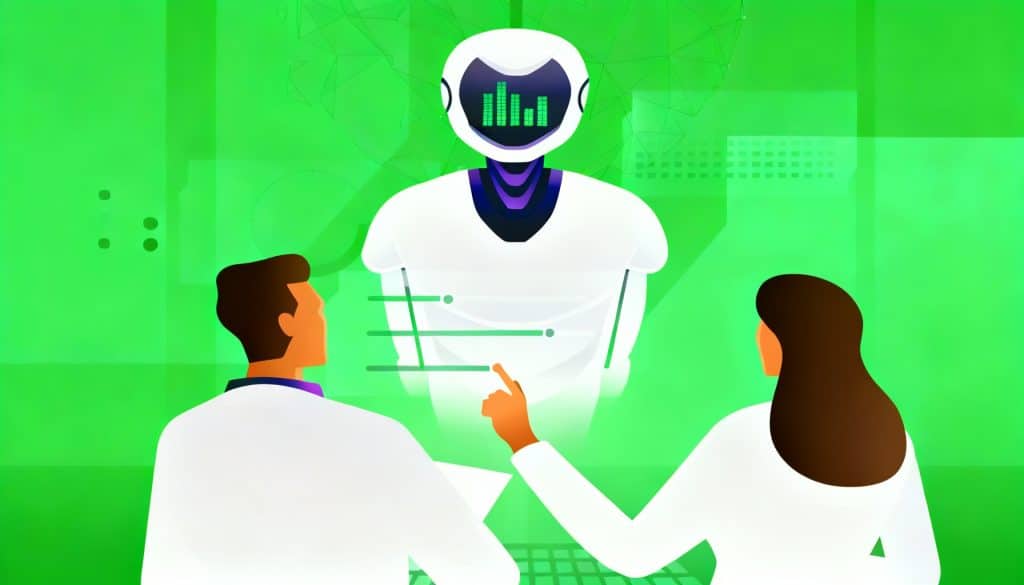
wo professionals discussing with an AI agent represented by a humanoid robot on a green background
AI agents deliver efficiency, but humans deliver vision. This is the essence of the Human Algorithm: combining AI’s ability to act fast with the uniquely human capacity to think better.
| AI Agents Handle | Human Leaders Handle |
| Data analysis at scale | Contextual interpretation |
| Speed and automation | Empathy and ethics |
| Pattern recognition | Strategic vision |
| Predictive simulations | Relationship management |
| Task optimization | Cultural and emotional awareness |
The future of leadership depends on balance. AI agents optimize efficiency, while human leaders guide decisions with empathy, ethics, and strategic foresight.
Also read: How To Drive More Traffic via Small Business SEO Services?
How Wild Creek Web Studio Leads With the Human Algorithm?
At Wild Creek Web Studio, we believe the future of leadership is not humans versus machines, but humans and AI thinking together. That is why we created The Human Algorithm, our proprietary framework that blends AI efficiency with human judgment to deliver ethical, strategic, and measurable growth.
Here are the five pillars of the Human Algorithm that guide everything we do:
- Purpose Over Tools: We do not start with technology; we start with outcomes. Every AI deployment is directly tied to strategic goals, such as market growth, visibility, or operational efficiency.
- Trust at the Core: Transparency, auditability, and bias checks are not add-ons. They are non-negotiables that keep AI accountable and leaders in control.
- Adaptive by Design: Business environments change quickly. Our systems are built to learn, refine, and adapt so you are always one step ahead.
- Human Insight as the Compass: AI delivers speed, but humans deliver meaning. We ensure empathy, ethics, and context remain central to every decision.
- From Intelligence to Impact: Insights alone do not grow businesses. We connect strategy to execution, from SEO to paid media, turning AI-driven clarity into measurable results.
The Human Algorithm is not just a philosophy. It is a leadership framework we built for the AI-first era, and it is how we help organizations think better, act faster, and grow with confidence.
👉 Connect with Wild Creek Web Studio to explore how the Human Algorithm can reshape your leadership and decision-making.
Conclusion
AI agents are transforming leadership by taking on routine decisions, surfacing insights faster, and helping leaders act with greater confidence. Yet, the real advantage lies in pairing this efficiency with human judgment, ethics, and contextual thinking. Machines deliver speed, but only people deliver meaning.
Start small with pilot projects, embed strong governance, and identify areas where AI agents can deliver the most impact. Leaders who learn to combine efficiency with ethics and foresight will shape organizations that thrive in an AI-first world.
Frequently Asked Questions
How do AI agents make decisions without human intervention?
AI agents follow a loop of perception, reasoning, and action. They analyze real-time data, align it with goals, and execute tasks autonomously, requiring human oversight only for exceptions or high-risk scenarios.
What safeguards ensure ethical decision-making by AI agents?
Ethical safeguards include setting decision boundaries, human-in-the-loop oversight, data privacy protections, and transparent frameworks. Regular audits ensure agentic AI aligns with organizational values while minimizing risks from bias, privacy issues, or unintended outcomes.
Which industries benefit the most from agentic AI-driven leadership?
Finance uses agents for fraud detection, healthcare for resource optimization, and manufacturing for supply chain efficiency. Any sector with complex, data-heavy operations benefits from agentic AI data driven decisions and automation.
Is an AI agent just another form of traditional software?
No, AI agents differ from traditional software. They are intelligent agents powered by machine learning and deep learning, designed to adapt, learn from user interactions, and autonomously complete tasks across enterprise systems and complex workflows.
How do autonomous agents handle complex problems in business processes?
Autonomous agents analyze vast amounts of data, identify patterns in complex scenarios, and use reinforcement learning to improve over time. They can manage specific tasks like supply chain management or optimize customer service, ensuring better operational efficiency and cost savings.
What role does natural language processing play in AI agents?
Through natural language processing, AI agents understand user behavior, interpret customer data, and extract relevant information from diverse data sources. This allows them to enhance customer support, improve enterprise software usability, and manage complex challenges across industries like financial services.
How do AI agents improve security in decision-making?
AI agents apply strict security measures such as monitoring for unauthorized access, safeguarding customer data, and ensuring ethical considerations in business processes. With built-in guardrails, they help leaders manage external tools and external systems responsibly while ensuring compliance.
Can AI agents learn and adapt from new information like human agents?
Yes. AI agents use feedback loops and reinforcement learning to adapt to new information, much like human agents refining judgment. This adaptability gives them a crucial role in process automation, software development, and tackling complex challenges with context awareness.
